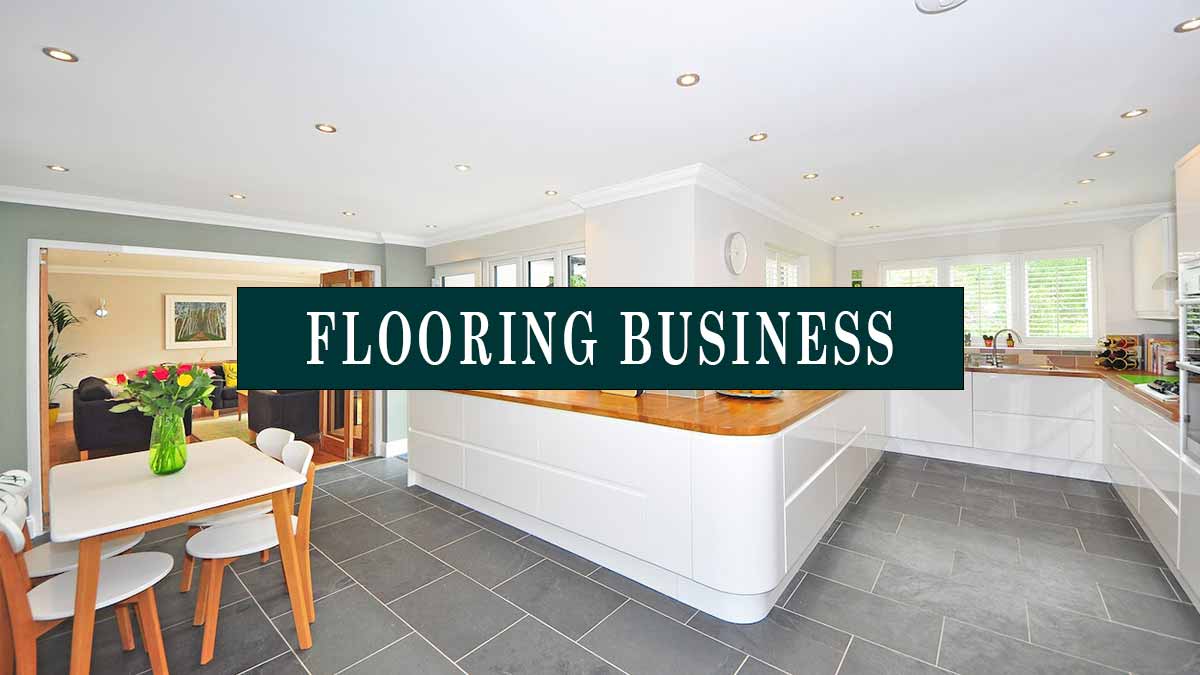Starting a flooring business can be a rewarding venture for those with a passion for interior design, craftsmanship, and entrepreneurship. Whether you’re skilled in hardwood, laminate, tile, carpet, or other flooring materials, this comprehensive guide will walk you through the essential steps to successfully launch and grow your own flooring business.
There is some scope and hope still exists for the newcomer in this industry. Newcomer has no such skill to compete with the existing players. So, this guide will help you to succeed and grow your business to full potential.
Understanding the Flooring Business
What is a flooring business?
A flooring business specializes in the supply, installation, and maintenance of various types of flooring materials. These materials can range from hardwood and laminate to carpet, tile, vinyl, and beyond. Flooring businesses play a crucial role in enhancing the aesthetics and functionality of residential and commercial spaces.
Why start a flooring business?
Starting a flooring business offers several compelling reasons:
- Growing demand: Flooring is a fundamental element in construction and renovation projects, ensuring a steady demand for flooring services.
- Profit potential: The profit margins in the flooring industry can be substantial, especially when offering high-quality products and craftsmanship.
- Creativity: It allows for artistic expression through design, pattern, and material selection.
- Entrepreneurial opportunity: As a flooring business owner, you have the flexibility to set your schedule and grow your business as you see fit.
9 Steps to Start Your Flooring Business
Market Research and Planning
Before launching your flooring business, conducting thorough market research and planning is essential. If you are from this flooring industry you may know some of the core customer behaviors. Which is beneficial for your own business.
Identifying your niche
Determine your specific niche within the flooring market. You might specialize in residential flooring, commercial projects, eco-friendly materials, or custom designs. Focusing on a niche can help you stand out in a competitive market.
Analyzing competitors
Study existing flooring businesses in your area to understand their services, pricing strategies, and customer base. Identify gaps in the market that you can fill or ways to differentiate your business.
Creating a business plan
Develop a detailed business plan that outlines your goals, budget, marketing strategies, and growth projections. A well-structured plan will serve as your roadmap to success and guide your decision-making.
Legal and Regulatory Requirements
Compliance with legal and regulatory requirements is crucial for the smooth operation of your flooring business. Every country in the globe has some rules and regulations on every legal issue. They differ based on your business location.
Business structure and registration
Choose an appropriate business structure, such as a sole proprietorship, LLC, or corporation, and register your business with the necessary state and local authorities.
Licensing and permits
Research and obtain the required licenses and permits to operate a flooring business in your jurisdiction. These may include contractor licenses, sales tax permits, and more.
Insurance considerations
Invest in comprehensive insurance coverage, including general liability insurance and workers’ compensation insurance, to protect your business, employees, and clients from potential risks and accidents.
Setting Up Your Flooring Showroom
In this business, you have to set up a showroom. Because it needs to be shown to the potential customer. If you plan to have a showroom, its location, layout, and design are essential considerations.
Choosing a location
Select a showroom location that is easily accessible to your target clientele, whether it’s homeowners, interior designers, or contractors. High-traffic areas and proximity to construction hubs can be advantageous.
Showroom layout and design
Create an inviting and well-organized showroom layout that showcases different flooring options, styles, and designs. Allow ample space for customers to explore and envision their projects.
Selecting flooring materials
Curate a diverse selection of flooring materials, including hardwood, laminate, tile, carpet, and more. Offer various styles, colors, and price points to cater to a wide range of preferences and budgets.
Supplier and Material Selection
Choosing reputable suppliers and quality materials is fundamental to your flooring business’s success.
Finding reputable suppliers
Establish strong relationships with reputable flooring material suppliers and distributors. Research their reputation, product range, and delivery reliability.
Evaluating material quality
Educate yourself about the quality standards for different flooring materials. Perform regular quality checks to ensure the materials meet your standards and customer expectations.
Negotiating supplier contracts
Negotiate favorable terms with your suppliers, including pricing, payment terms, and delivery schedules. Building strong relationships with suppliers can lead to better deals and support.
Hiring and Training Staff
Recruiting skilled and knowledgeable staff is vital to deliver quality flooring installations.
Recruiting skilled installers
Hire experienced flooring installers who are proficient in working with various materials and techniques. Verify their certifications and check their references.
Providing product knowledge training
Offer ongoing training to your staff to keep them updated on the latest flooring products, trends, and installation methods. Well-informed employees can provide better guidance to customers.
Ensuring safety and compliance
Ensure that your installers are trained in safety protocols and comply with all relevant regulations, including Occupational Safety and Health Administration (OSHA) standards.
Pricing and Marketing Strategies
Effective pricing and marketing strategies are essential for attracting and retaining customers.
Setting competitive prices
Research the pricing strategies of your competitors and set competitive yet profitable prices for your services. Consider factors like material costs, labor, and market demand.
Branding and marketing tactics
Develop a strong brand identity that reflects your flooring business’s values and unique selling points. Invest in marketing tactics like local advertising, social media, and online listings to reach potential clients.
Online presence and advertising
Create a professional website where customers can explore your services, view your portfolio, and request quotes. Utilize search engine optimization (SEO) to improve your website’s visibility in online searches.
Read Also: How to Start an Airbnb without Owning Property
Operational Management
Efficient operational management is crucial for delivering projects on time and exceeding client expectations. Handling operations is the highest priority. If you are in this post you have to focus and manage all the responsibility on time.
Managing inventory
Maintain a well-organized inventory system to track flooring materials, avoid shortages, and ensure efficient project management.
Project management and scheduling
Implement effective project management and scheduling tools to allocate resources, plan installations, and meet project deadlines.
Customer service excellence
Provide exceptional customer service by communicating clearly with clients, addressing their concerns promptly, and delivering quality installations. Happy customers are more likely to refer to your services.
Scaling Your Flooring Business
As your flooring business grows, consider opportunities for expansion and scaling.
Expanding services and offerings
Diversify your services by offering additional flooring-related services such as refinishing, repairs, or custom designs. Expanding your offerings can attract new clients and increase revenue streams.
Geographic expansion
Explore opportunities to expand your business into new geographic areas or markets. Expanding your reach can tap into new clientele and project opportunities.
Franchising opportunities
If you’ve achieved significant success, consider franchising your flooring business to replicate your business model in other locations. Franchising can be a lucrative growth strategy.
Quality Assurance and Customer Satisfaction
Ensuring quality installations and maintaining customer satisfaction is key to the long-term success of your flooring business.
Ensuring quality installations
Implement rigorous quality control processes to guarantee that every installation meets your high standards of craftsmanship. Conduct post-installation inspections to address any issues promptly.
Handling customer complaints
Handle customer complaints professionally and promptly. Effective problem-solving and resolution can turn dissatisfied customers into loyal advocates.
Referrals and reviews
Encourage satisfied clients to provide referrals and reviews. Positive word-of-mouth and online reviews can significantly boost your flooring business’s reputation and growth.
Read Also: How to Start a Dump Truck Business – A Complete Guide
Conclusion
Starting a flooring business requires careful planning, a commitment to quality, and effective marketing. With dedication and the right approach, you can build a successful flooring business that transforms spaces and leaves satisfied customers in your wake.
[Frequently Asked Questions] FAQs
Here are some commonly asked questions about starting a flooring business:
What skills are essential to succeed in the flooring business?
Essential skills include knowledge of flooring materials, installation techniques, project management, customer service, and business management.
Do I need formal training or certification to start a flooring business?
While formal training and certification are not mandatory, they can enhance your credibility and expertise. Consider enrolling in courses or seeking certification from industry organizations.
How do I differentiate my flooring business in a competitive market?
What is the typical cost of starting a flooring business?
The startup costs can vary widely based on factors like location, size, and scope of services. On average, you might need between $10,000 to $50,000 or more for equipment, materials, insurance, and marketing.
How can I find reliable suppliers for flooring materials?
Look for reputable flooring material suppliers through online directories, industry trade shows, referrals from experienced professionals, and by checking supplier reviews and references. Build relationships with suppliers known for quality and reliability.




